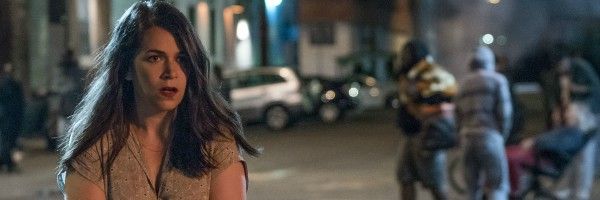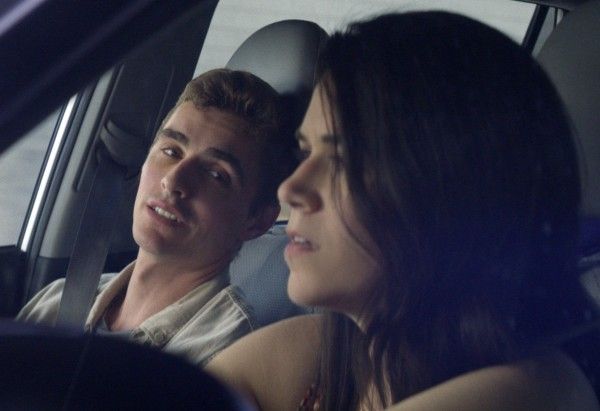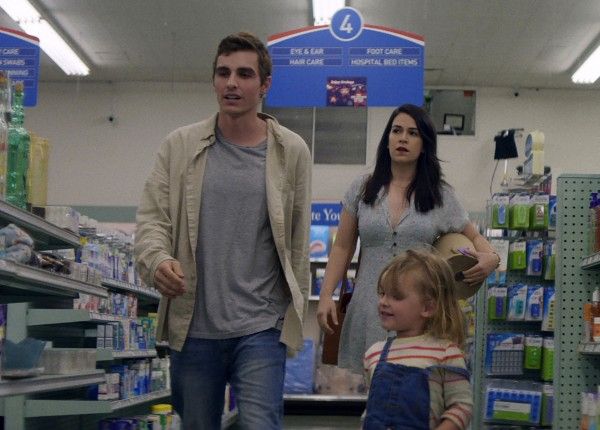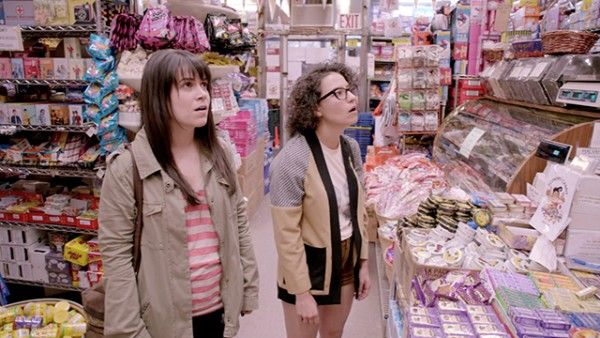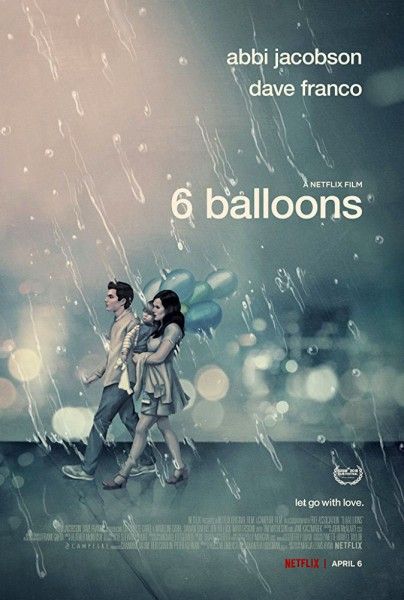From writer/director Marja-Lewis Ryan, the drama 6 Balloons (available to stream at Netflix, starting on April 6th) takes place over the course of one night, as Katie (Abbi Jacobson) drives across Los Angeles with her heroin-addicted brother, Seth (Dave Franco), in search of a detox center. With his young daughter along for the ride, Katie begins to question how much longer she can enable her brother’s habit without insisting that he make the decision to get clean on his own.
During this 1-on-1 phone interview with Collider, actress Abbi Jacobson talked about why she wanted to sign on for 6 Balloons, what most scared her about playing this character, how she most related to Katie, and working with Dave Franco and seeing the transformation he went through for his role. She also talked about what Broad City, her Comedy Central TV series with co-creator Ilana Glazer, has meant to her, the experience she had directing episodes last season, and where she draws her comedy line.
Collider: You did really tremendous work on this movie. Obviously, it’s not the easiest movie to watch because it’s not the easiest subject matter, but everybody was so great in it.
ABBI JACOBSON: Oh, thanks so much! Yeah, it’s an intense movie, for sure.
This is obviously very different from what we’re used to seeing you do. How did this come your way? Was it just a script you got and read?
JACOBSON: Yeah, I was sent the script and loved it. Marja-Lewis Ryan, who wrote and directed it, had thought of me for it, which is crazy. That doesn’t happen, all the time, for me. I auditioned a couple of times because this is a very different kind of part for me. I’d never done anything like this before. I think they had to fight for me a little bit, rightfully so. So, I auditioned a couple of times, and then I got it. I was very nervous about doing it, as well. I had lots of doubts. It was just very scary to do something so outside of my comfort zone.
What was it that really sort of most scared you about making it, and what really most excited you about doing this?
JACOBSON: Well, I really related to the character. I’ve never had a specific situation like this happen to me. But the part is based off of one of our producers, Samantha Housman’s, life and a night that she had with her brother. I could see why Marja thought of me because Sam and I look alike. We have a similar vibe, in real life, so that made me feel comfortable. Also, Sam was on set with me, the whole time, so I could always check in with her just about what she was feeling when [certain things] happened. I was just very concerned about it feeling real and grounded because it takes place over the course of one night, and we shot it over the course of 19 days. I wanted to make sure it was tracking ‘cause it wasn’t always in order.
But the thing that I related to the most was the way that a lot is going on and Katie is internalizing a lot. She’s planning a surprise party for her boyfriend, and then she finds out that Seth has relapsed. Because she’s the last person in his life, enabling him, she’s internalizing all of this. I relate to that a lot, just because I often feel overwhelmed, in my own life. When a lot of shit’s going on, I’ve found a way to have this calm, collected vibe of, “It’s cool. It’s okay. We’ll figure it out.” Obviously, Katie is going through a heightened version of that, but internalizing emotion was something that I am familiar with, and presenting yourself in a different way from maybe how you’re feeling.
One of the things I was most interested in is was that this would be a very different night, if it was the night that Katie found out that her brother was addicted to heroin, at all, versus it being the sixth time that Seth has relapsed. This has been going on for years. If it was the first time, it would be this raw emotion. That might be like the story that we’ve seen before, where someone discovers that someone is addicted, or someone discovers that someone has overdosed and they didn’t know what was going on. This is really the story about a family that has been going through this addiction for years, and it’s this cyclical thing. That is a story that I haven’t seen before, so what does that look like? That’s not just tears. It’s more like anger. That was something that I wanted to make sure felt true to that. It’s frustration and anger. There’s just so much happening.
When you were figuring this character out, how did you come to terms with the fact that she has been putting up with all of this bullshit, for so long?
JACOBSON: That’s the thing that’s so sad. I’m from an upper middle-class area, outside Philly. You’re brought up to be like, “Heroin addicts aren’t here. That’s something that happens to other people.” When in fact, in high school, it was rampant in my town. What does that feel like, when it becomes something you’re used to, but you still can’t believe it’s happening, over and over. The thing I love, that Marja does and that Dave did, is that you can see why she fights for him and why she’s still there because he is such a great guy. For an enabler, I think they have to let the person want to get help on their own. That’s ultimately the only way that it happens and the only way that they can stay sober. He’ll always be able to rely on her, if she’s constantly bringing him back.
The relationship between this brother and sister is so crucial to this story. What was it like to have Dave Franco to explore that with, and to see the transformation that he went through for this?
JACOBSON: Dave really went all out, for this part. It was really incredible to watch him transform himself, physically. He really learned what it was like and what it would feel like. He was pretty immersed in that, for the time that we were shooting. We met on this project. We went to dinner before we shot, when we were doing rehearsals, and hit it off, immediately. It felt like a familial relationship that we had. We had a really great dynamic. Then, when we shot the film, it was a first for me, but I just didn’t feel very social when we were shooting it because I needed to be in this mind-set. The whole thing is over the course of the night, and we were also shooting at night, so “lunch” was at one in the morning. I needed to stay in the Katie zone, so I would just go eat and be by myself, and Dave did, too. We’re the best of friends now, after the fact, but during the time, we got along, but we didn’t hang out, on purpose.
What has it meant to you to be able to create a show like Broad City and be able to keep returning to it, season after season, and know that fans are anxiously awaiting the new season, as well?
JACOBSON: It’s surreal, and it’s weirdly only in moments like this, when someone asks me that. I’m someone who, when I’m not working on this, I’m working on this thing, and I have a hard time processing stuff. I feel so incredibly lucky to have Broad City in my life. I get to express myself, in that way, and for people to love it, as much as I do, is constantly surprising and reaffirming, for me. When we started doing it, I don’t know if I imagined anything like this happening with it.
How did you find the experience of actually directing episodes? Is that something you’re looking and hoping to do more of?
JACOBSON: Yeah. I loved it! I directed two episodes, last season, and I really loved it. It felt like the last piece of the puzzle for me. We wear all these different hats on the show. We write, we produce, and then we act. And then, we’re in the edit the whole time. I’m not working the edit machines, but we’re sitting behind the editor in post. So, I’ve gotten to have creative control over everything. And then, we hired these amazing directors to come in and they get to put their spin on it, in this great way. So, that was the last hat that I got to put on where I got to have my complete vision enacted. Obviously, Ilana [Glazer] and a lot of other people then put their two cents into it and their creativity onto it. Also, our crew is like family to me, so I’m getting to do it with them, too. I don’t know. Just getting to storyboard scenes, really working closely with our D.P., getting to talk with actors, getting to really shot list stuff, and then, in the edit, getting to do a first director’s cut, before it goes to me and Ilana, it was just really satisfying. I’m doing it again, this season. Something I haven’t done is gotten to direct when I’m not also in it. I will say that was very difficult. I was running back and forth, in front of and behind the camera. So, I’m really excited to have the opportunity, at some point, to direct something that I’m not also acting in.
When it comes to comedy, is there anything that you won’t do, if it gets a laugh and makes sense with the story that you’re telling? Do you have a comedy line that you won’t cross, or is everything fair game?
JACOBSON: I’m sure there’s a line. In everything I do, but especially on Broad City, where I’m also writing the material, we really try our best to be as inclusive as possible, and I don’t really like mean-spirited comedy. I’m not a fan of that. Anything we’ve done, we’ve tried for it never to be mean-spirited. I always hope no one has taken it that way. I don’t love snarky stuff. Anything that’s outright mean or discriminatory, in any way, is where I would draw the line.
Well, I hope you also continue to do more drama because I thought you were so exceptional in this movie.
JACOBSON: Well, thank you so much.
6 Balloons is available to stream at Netflix on April 6th.

